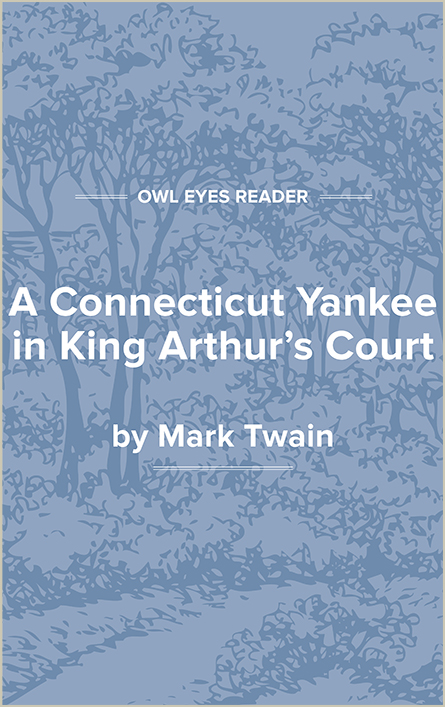Study Guide
Analysis Pages
Summary
Struck on the head during a quarrel in a New England arms factory, a skilled Yankee mechanic (later identified as Hank Morgan) awakens to find himself being prodded by the lance of an armored knight on horseback. The knight is Sir Kay Seneschal of King Arthur’s Round Table and the time is June, 528 c.e., in England. So a foppish young page named Clarence informs the incredulous Hank as the knight takes him to white-towered Camelot. Remembering that there was a total eclipse of the sun on June 21, 528, Hank decides that should the eclipse take place, he will know that he is indeed a lost traveler in time turned backward to the days of chivalry.
At Camelot, Hank listens to King Arthur’s knights as they brag of their mighty exploits. The magician, Merlin, repeats his story of Arthur’s coming. Finally, Sir Kay tells of his encounter with Hank, and Merlin advises that the prisoner be thrown into a dungeon to await burning at the stake on June 21.
In prison, Hank thinks about the coming eclipse. Merlin, he tells Clarence, is a humbug, and he sends the boy to the court with a message that on the day of his death, the sun will darken and the kingdom will be destroyed. Just as Hank is about to be burned, the sky begins to dim. Awed, the king orders the prisoner released. The people shout that Hank is a greater magician than Merlin, and the king makes him his prime minister. Soon, however, the populace demands another display of his powers. With the help of Clarence, Hank mines Merlin’s tower with some crude explosives he makes and then tells everyone he will cause the tower to crumble and fall. When the explosion occurs, Hank is assured of his place as the new court magician. Merlin is thrown into prison temporarily.
The lack of mechanical devices in King Arthur’s castle bothers the ingenious New Englander, and the illiteracy of the people hurts his American pride in education. He decides to raise the commoners above mere slaves to the nobility. After several years pass, he has a title of his own, for the people call him “The Boss.” As the Boss, he intends to modernize the kingdom. His first act is to set up schools in small communities throughout the country. He has to work in secret, because he fears the interference of the Church. He trains workmen in mechanical arts. Believing that a nation needs a free press, he instructs Clarence in journalism. He has telephone wires stretched between hamlets, haphazardly, as it turns out, because there are no maps by which to be guided.
After Sir Sagramour challenges Hank to a duel, the king decides that Hank should go on some knightly quest to prepare himself for the encounter. His mission is to help a young woman named Alisande, whose precise story he is unable to get straight. With many misgivings, he puts on a burdensome suit of armor and on his heavy charger starts off with Alisande, whom he calls Sandy. Sandy tells endless tall tales as they travel through the land. Along the way, Hank marvels at the pitiable state of the people under the feudal system. Whenever he finds a man of unusual spirit, he sends him back to Clarence in Camelot, to be taught reading, writing, and a useful trade. He visits the dungeons of a castle at which he stays and releases prisoners unjustly held by the king’s cruel sister, Morgan le Fay.
In the Valley of Holiness, he finds another opportunity to prove his magic skill. There a sacred well has gone dry because, according to legend, a sin was committed. When he arrives, Merlin, now released from prison, is attempting magic to make the spring flow. Hank repairs a leak in the masonry at the bottom of the well; then, with much pomp, he restarts the water flow. As the well fills, Merlin goes home in shame.
By chance, Hank finds one of his telephone installations in a cave nearby. He uses the phone to talk to Clarence, who tells him that King Arthur is on his way to the Valley of Holiness to see the flowing spring. He returns to the spring to find a fake...
(The entire page is 1,295 words.)
Owl Eyes subscribers get unlimited access to our expert annotations, analyses, and study guides on your favorite texts. Master the classics for less than $5/month!

